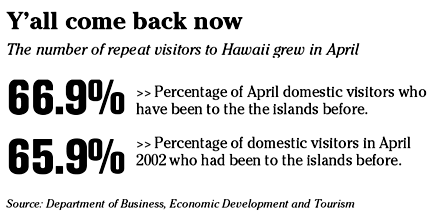
Reported by Star-Bulletin staff & wire
BACK TO TOP |
SARS doesn't scare office workers
The killer SARS virus dominates headlines around the world, although its effect in U.S. workplaces has remained muted, according to a survey of human resources managers.Asked to complete the sentence, "Fear of SARS in our workplace is ...," 62 percent of HR professionals responded "low to nonexistent." Another 18 percent answered, "moderate to low."
Only 3 percent described fear of severe acute respiratory syndrome in the workplace as high. Another 10 percent said it's high "only among the usual worrywarts," while 8 percent said it's high "only among our frequent fliers."
The online poll was conducted in late April, with 683 responses at two industry Web sites operated by Business & Legal Reports Inc., a publisher of regulatory and legal compliance data that is based in Old Saybrook, Conn.
Out of work? No shame in it
Good news for unemployed executives -- recruiters say that being between jobs is losing its stigma in the talent-search field.According to a poll of 323 recruiters, 81 percent said they believe the stigma of being unemployed is less detrimental to the executive candidate now than it was five years ago. Last year, nearly a quarter of candidates presented to an employer by a search firm was unemployed at the time, up from 21 percent in 2001 and 13 percent in 2000.
Of course, this assumes there's no past behavior that led to a dismissal.
Still, those companies now hiring are becoming more stringent with job candidates in other ways: Nearly 90 percent of recruiters said job specifications are becoming more demanding, and three in four say companies are more cautious about extending relocation offers.
The poll was conducted by Connecticut-based ExecuNet, an executive recruitment and career management firm.
Silicon Valley execs saw pay fall in 2002
SAN JOSE, Calif. >> The highest-paid executives of Silicon Valley's largest companies took home $1 billion last year, according to an annual executive compensation survey.The total, which included salary, bonus and estimated stock options gains for 754 executives, was only about one-fourth of the $3.8 billion in 2001 and one-fifth of the record $4.7 billion in 2000, the San Jose Mercury News reported yesterday in its yearly study of area execs' pay.
Thomas Siebel, chief executive of Siebel Systems, was first in the survey with income of $34.6 million.
In 2002, executive compensation fell as the stock market continued to founder. In just two years, the valley's top execs have seen the value of their vested, unexercised options drop from $16 billion to $2.2 billion.
Hong Kong's airport aims to restore traffic
HONG KONG >> Hoping to restore air traffic devastated by the SARS crisis and a World Health Organization travel advisory, Hong Kong airport managers yesterday announced a $12.8 million package of lower landing fees and other incentives.Thousands of flights have been canceled, and the Airport Authority said passenger traffic was off by 80 percent last week, with less than half of the normal services operating.
Airlines that restore services can pay only half the regular landing fee on flights that are 20 percent full or less, Airport Authority Chairman Victor Fung told a news conference. Restored flights more than 20 percent full will get smaller discounts, he said.
Talk about money before saying 'I do'
You're a perfect couple, with compatible goals, views, experiences -- but have you gotten really intimate and talked money?Many couples don't, and with wedding season upon us, the personal finance site Bill Saver.com suggests you and your partner have a frank discussion, sizing up each other's fiscal state before heading down the aisle.
A few tips for the talk:
>> Don't assume your partner is coming to the marriage debt-free, with a retirement plan and a stash of cash. You should disclose all debt, including student loans, car payments and credit card balances.>> Discuss your attitudes and habits about spending and saving. You may disagree on these topics, but it's important to reach a comfort level with how the other person will act toward the marriage's assets and debts.
>> Determine how bills will be paid. Should accounts be separate?
>> Resist a new house, car, furniture and great trips. As the company puts it, such splurges "are not newlywed entitlements" and big spending the first year of wedded bliss can become a pain later, when you're ready to buy a house or have a baby.
>> Start saving in retirement plans and Individual Retirement Accounts. A double income can help bulk up these investments, and you now have a spouse's old age to consider.
>> Update or buy insurance coverage. You may need more now.
